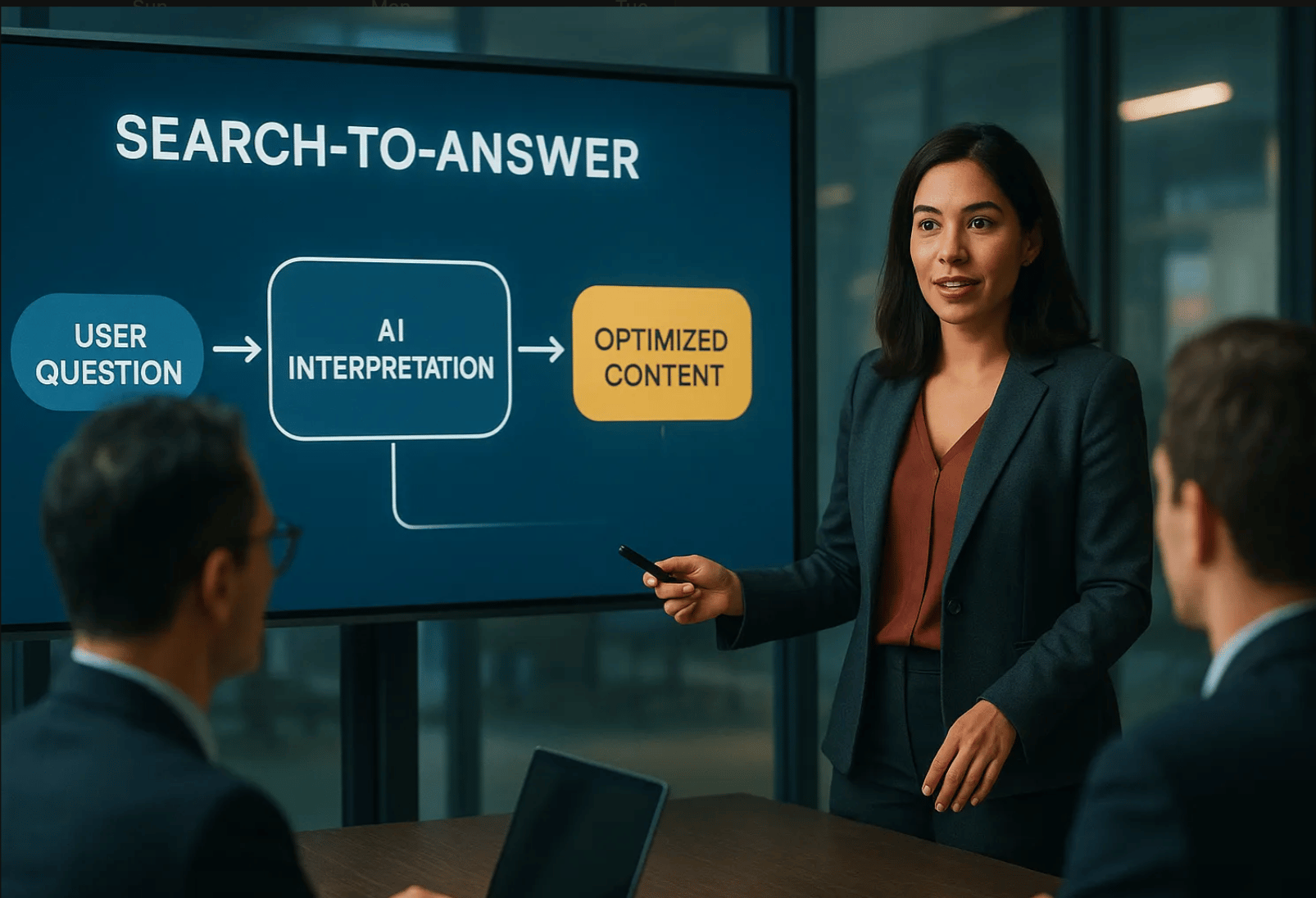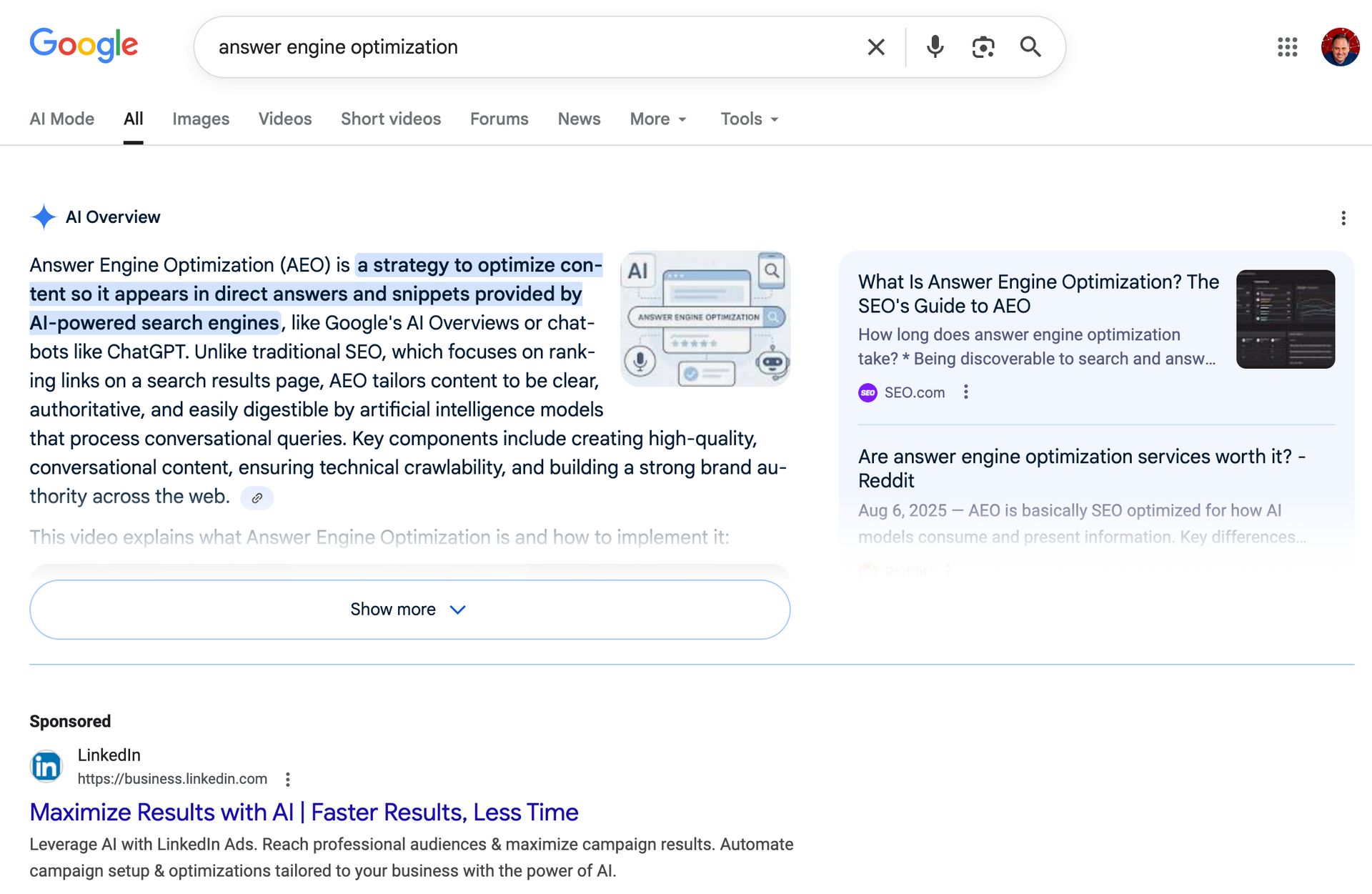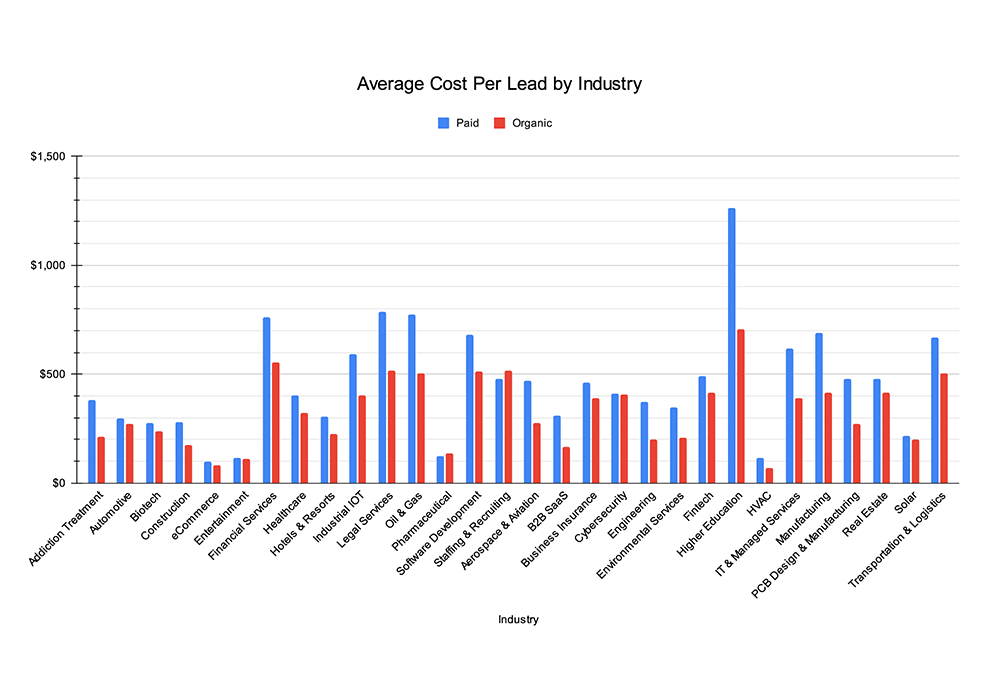Not long ago, one of the world’s largest hedge funds contacted me about AI upskilling for their analysts.
During our first call, I asked the question I always ask: “How did you find me?”
Their answer surprised me: “ChatGPT recommended you.”
For years, my business has grown through referrals—word of mouth, professional networks, and LinkedIn. But this was different. ChatGPT had become a sales channel, and I hadn’t lifted a finger.
Somewhere in its massive training data, my work was registered as credible enough to be cited.
No ad spend. No outreach. Just well-structured content that an AI model found authoritative.
That’s the future of discovery. And it’s already here.


Answer Engine Optimization: The Future of Search
How AI-Powered Search is Changing Digital Strategy
Businesses have spent decades perfecting Search Engine Optimization (SEO). But a new discipline is emerging—Answer Engine Optimization (AEO)—focused on how AI systems, not just humans, discover and interpret information.
According to SparkToro and Datos Research, Google’s global search volume grew 21.6% year over year in 2024, surpassing 5 trillion annual searches, or roughly 14–15 billion queries per day. Google still dominates about 90% of all search traffic, but generative platforms like ChatGPT are now handling an estimated 37.5 million search-like prompts daily—about 373 times fewer than Google, but growing fast.
The Google AI Overviews Transformation
In May 2023, Google introduced the Search Generative Experience (SGE) during Google I/O. After a year of testing in Search Labs, the company rebranded and launched AI Overviews to all U.S. users in May 2024, with expansion to over a billion users by year’s end.

AI Overviews change Search Engine Ranking Positions by moving them down below the AI Overview and Sponsored Links in Google.
The impact was immediate. Independent analyses showed steep declines in organic click-through rates (CTR) where AI Overviews appear.
GrowthSRC Media reported that top-ranking pages saw CTRs fall 32–35%.
Ahrefs found a similar 34.5% drop in average CTR.
Mail Online observed CTR losses of 50% or more for key keywords.
A Pew Research summary found users clicked results 8% of the time when AI summaries appeared, compared to 15% without—a 47% relative decline.
“Zero-click” searches—where users don’t visit any external site—increased from 56% to 69% between May 2024 and May 2025.
Some sectors have been hit particularly hard. Chegg reported a 49% drop in non-subscriber traffic, attributing the decline to AI Overviews answering study questions directly. The company’s ongoing antitrust lawsuit against Google underscores how AEO could redefine entire industries.
Interestingly, Google says AI Overviews is increasing total search engagement, citing internal tests showing a 10% uptick in searches for covered queries.
From Keywords to Conversations
Search engines have evolved from keyword matchers to intent-driven AI systems. Algorithms now emphasize meaning, context, and user intent over raw keyword frequency.
As people shift toward AI assistants like ChatGPT, Claude, and Perplexity for direct answers, content strategy must evolve. These tools don’t simply list pages—they read them, synthesize information, and generate responses. If your content is structured clearly and backed by evidence, it’s far more likely to be cited.
What Makes AEO Different from SEO
SEO aims to get your website clicked.
AEO aims to get your content quoted.
The goal shifts from being the destination to becoming the source. When users ask an AI a question, they often receive synthesized answers built from multiple authoritative sources. If your content is formatted for easy parsing and attribution, it can become part of that answer.
These AI-driven referrals are high intent. The user arrives informed, ready to act, and often with built-in trust—the digital equivalent of a warm referral.
The Business Impact: Real Dollars, Real Clients
The implications of this change in search are tangible. When a decision-maker asks ChatGPT for “AI training experts,” the recommendation carries implicit authority.
Traditional lead generation can cost $100–$700 per qualified lead based on industry. An AI citation costs nothing yet reaches the buyer at the exact moment of need.

Average cost per lead by 30 industries. Source: First Page Sage
This shift extends beyond consulting. E-commerce brands, SaaS companies, and even local businesses are being surfaced as AI answers. The key is content quality and accessibility, not ad budgets.
Structuring Content for AI Comprehension
AI systems favor clarity and structure. The question-and-answer format performs best, mirroring natural user intent. Combine that with schema markup to ensure machine readability.
Use FAQPage schema or HowTo markup for structured data.
Follow Google Search Central – Structured Data Guidelines and SEMRush’s schema guides for implementation.
Validate markup accuracy—misaligned schema can harm visibility.
Structured content lets search engines generate rich snippets and gives AI systems precise, attributable data to reference.
Practical Formatting Examples
Good:
“What are the key security risks when migrating to the cloud?”
Follow with a direct, well-defined answer, then context and supporting evidence.
For instance:
“According to Gartner’s 2024 AI ROI report, 68% of companies saw positive ROI within six months of deploying AI analytics.”
The pattern—question, clear answer, cited data—maximizes both comprehension and extractability.
Measuring AEO Success
Traditional analytics can’t measure citations in AI systems. Instead, track:
Citations: How often your brand appears in ChatGPT, Claude, or Perplexity responses.
Conversion quality: Leads from AI-driven discovery often close faster.
Brand search volume: Rising direct search queries signal effective AEO.
Engagement depth: Visitors from AI referrals often spend more time on pricing or documentation pages.
Use tools like LLMO Metrics, Profound, and Passionfruit to see if your brand or content is cited by AI platforms.
The Evolving Traffic Paradigm
AEO doesn’t replace SEO—it strengthens it. Structured, authoritative content performs well in both search engines and AI-generated answers. The two strategies reinforce one another.
As AI becomes the first layer of digital discovery, visibility will depend less on rank position and more on citation frequency and information clarity. Businesses optimizing for AI readability now will lead tomorrow’s digital channels.
Looking Ahead
The 5 trillion Google searches in 2024 represent billions of questions seeking answers. Meanwhile, AI assistants field millions more that never touch traditional search engines.
If your company relies on organic search traffic, focus on making your knowledge clear, structured, and trustworthy.
AEO isn’t an SEO tactic—it’s a content discipline for the changes reshaping search.

I appreciate your support.

Your AI Sherpa,
Mark R. Hinkle
Publisher, The AIE Network
Connect with me on LinkedIn
Follow Me on Twitter


